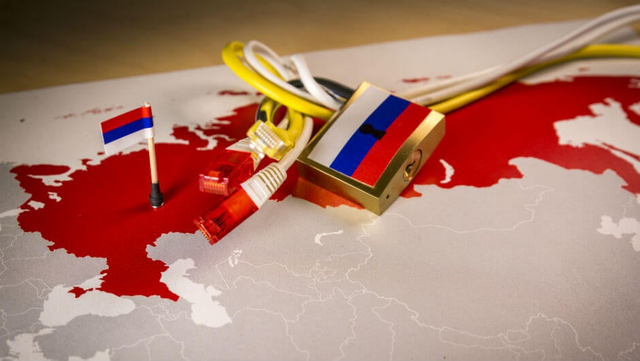
A new path Russia has threatened to take in isolation from the world. After the Internet has turned into a global forum, Russia announced that it might resort to isolation from the global network, according to Medvedev, Deputy Chairman of the Russian Security Council.

Medvedev's comments came after the mass protests that swept more than 100 Russian cities during the past weekend, against the backdrop of the arrest of prominent dissident Alexei Navalny.
The recent Russian announcement brought to mind the Internet conditions in China, which are amazingly controlled by the Chinese government, and raised questions about Russia's future approach to using the Internet.
When China decided to open up to the world in the early 1980s, former Chinese leader Deng Xiaoping - the architect of openness and renaissance - expressed his concern at the time and likened it to someone who opens a window in pursuit of fresh air, he must expect some flies to enter.
With the growing role of the Internet in the world, China did not bear the flies, so it decided in the year 2000 to close the window and expel the flies, after the launch of the "Great China Fire Wall" project, or what is also known as the Golden Shield, which is operated by the Ministry of Public Security in a form and employs less than 50 A thousand people to censor and filter harmful content from search engines, according to Bloomberg.
So has Russia become close to the point where it can control the Internet and close the window, as is the case in China now? Sky News Arabia polled experts and specialists to answer the thorny question.
Fadi Ramzy, a digital media expert and lecturer at the American University in Cairo, confirms that Russia can isolate itself from the global Internet, and that this will happen in the form of closure; The Internet will work inside Russia, but it will be hidden from the internal world.
The digital media expert added to Sky News Arabia, that Russia has taken the path of restricting and controlling content and trends on the Internet several years ago, and Russian efforts in this regard culminated in the signing of Russian President Vladimir Putin, in May 2019, of the Sovereign Internet Law, which allows Russia to be isolated from Global network.
He explained, "The philosophy of the sovereign Internet law is based on the exclusion of foreign servers, meaning that all telecommunications companies are obligated according to this law, that the Internet connection is through servers on Russian territory, and thus it is easy to disconnect from the global network easily."
Ramzy pointed out that this law is similar to what is happening in China, in terms of deep surveillance of people, in 2019 also Russia launched several legislations under which the authorities allow the prosecution of people, due to the content and political trends on the Internet.
Although Russia has come a long way in this matter about three years ago, the digital media expert attributes the reason for the recent wave of dispensing with the global network, as a result of the burning events against the backdrop of the demand of the Russian opposition, Alexei Navalny, to verify that the Russian president owns a luxurious palace.
He continued: "With the sentence of three and a half years in prison for Navalny, along with the outbreak of demonstrations, there are great opportunities to activate Russia's sovereign Internet law."
Ramzi concludes his speech to Sky News Arabia by stressing that the primary goal of this law is to fully control and control Internet content, which is an expected and logical step, as the idea of tightening the screws on the Internet is a concern of many governments; Especially as the internet is pushing things out of control.
American control
For his part, Khaled Al-Baramawi, a specialist in digital media, believes that the main pretext for the Russians, which the Russians adopt in the issue of the Internet, is the United States' interference and that the Internet is run through it, and this does not contradict the truth in a large extent.
Al-Barmawy added to Sky News Arabia, that despite the intervention of the United Nations, the International Telecommunication Union and the tops of Internet regulation, in the end the global network is still under the control of America, whether at the level of the administration itself, or through the technology used.
He continued: "In my opinion, the problem facing Russia because of the Internet, is mainly a political and security problem, especially since the political system in Russia is mainly subject to security considerations, and there are margins of freedom, but according to their own considerations."
China is a different model
Al-Barmawi believes that the situation in China is different from the situation in Russia; He says: "China was able to control the situation early; when it began to expand, it was according to its own rules. The infrastructure bears such adventures, as it has its own servers and technology, so China is a country that has the legislative and technological infrastructure that helps it control things."
The digital media expert likens the Internet to an aviation network; Where data entry can be prevented with the same philosophy of closing the airspace, and the Internet becomes inside the country, and no one will be able to communicate with the outside.
And here a question arises: Does Russia have enough e-commerce sites? Or social networks, emails, and apps that can handle the pressure and have quality?
He continues: "In the end, the idea of disconnecting from the Internet is in principle, but it is not an easy matter, especially since more than 90 percent of the Internet servers currently are American servers, in addition to the fact that most of the Internet services such as applications, websites and others are also American, and dispensing with them in favor of Poor alternatives, put the Internet in Russia back 10 years, is the Russian public able to understand this?
Al-Barmawi concludes that the situation of the media may not be affected by the Russian media being isolated from the Internet significantly, because the media is of a local nature, and a deficit may appear only in the international media. If Russia is effectively disconnected from the global Internet.
@crypto.piotr
Downvoting a post can decrease pending rewards and make it less visible. Common reasons:
Submit